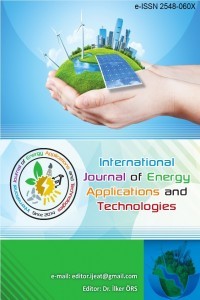A comparison of PSO and Fmincon methods for finding optimum operating speed and time values in trams
A comparison of PSO and Fmincon methods for finding optimum operating speed and time values in trams
All the studies in urban railways gained importance with the requirement of developing in this area. However, not only technological development but also energy-saving conditions have great importance. One of these efficiency conditions is to know the optimum operating conditions. There are two electronic drive-warning systems. These warning systems are Driver Advisory System (DAS) and Automatic Train Operation (ATO), which are algorithm-based. To enrich these algorithms with meta-heuristic methods provides that it can be adapted to the changing operating conditions. Thus, flexible management can be achieved.
In this study, the Particle Swarm meta-heuristic and Fmincon which is a nonlinear programming solver in MATLAB methods are used to calculate optimum driving speed, acceleration, cruising, coasting, and full braking times under different operating conditions. Comparative optimization results of these selected methods are presented. Thus, attention is drawn to the efficiency in driving technique with different optimization methods. Specific speed-specific driving time matches obtained can be used to develop innovative driving warning systems.
Keywords:
Energy efficiency in railways, Particle swarm, Fmincon Optimization, Drive warning systems,
___
- Fernández-Rodríguez, A., Fernández-Cardador, A. and Cucala, A.P. July 2015. Energy Efficiency In High Speed Railway Traffic Operation: A Real-Time Ecodriving Algorithm. Proceedings of the IEEE 15th International Conference on Environment and Electrical Engineering (EEEIC), 10(13), Rome, Italy, 325–330.
- Scheepmaker, G.M., Goverde, R.M. and Kroon, L.G. 2017. Review of Energy-Efficient Train Control and Timetabling. Eur. J. Oper. Res., 257, 355–376.
- Howlett, P., Milroy, I. and Pudney, P. Energy-Efficient Train Control. Control Eng. Pract., 2, 193–200, 1994.
- Qu, J., Feng, X. and Wang, Q. 2014. Real-Time Trajectory Planning For Rail Transit Train Considering Regenerative Energy. Proceedings of the 17th International IEEE Conference on Intelligent Transportation Systems (ITSC), 8–11 October, Qingdao, China, 2738–2742.
- Milroy, I.P. 1980. “Aspects of Automatic Train Control”. Ph.D. thesis, Loughborough University, Leicestershire, UK.
- Liu, R.R. and Golovitcher, I.M. 2003. Energy-Efficient Operation Of Rail Vehicles. Transp. Res. Part A, 37, 917–932.
- Chang, C.S. and Sim, S.S. 1997. Optimizing Train Movements Through Coast Control Using Genetic Algorithms. IEE Proc. Electr. Power Appl., 144, 65–73.
- Wong, K.K. and Ho, T.K. 2004. Dynamic Coast Control of Train Movement with Genetic Algorithm. Int. J. Syst. Sci., 35, 835–846.
- Acikbas, S. and Soylemez, M.T. 2008. Coasting Point Optimisation For Mass Rail Transit Lines Using Artificial Neural Networks And Genetic Algorithms. IET Electr. Power Appl., 2, 172–182.
- Chevrier, R. Marliere, G. Vulturescu, B. and Rodriguez, J. 2011. Multi-Objective Evolutionary Algorithm For Speed Tuning Optimization With Energy Saving In Railway: Application and Case Study. RailRome, Rome, Italy.
- Chevrier, R. Pellegrini, P. and Rodriguez, J. 2013. Energy Saving in Railway Timetabling: A Bi-Objective Evolutionary Approach For Computing Alternative Running Times. Transp. Res. Part C, 37, 20–41.
- Huang, Y. Ma, X. Su, S. and Tang, T. 2015. Optimization of Train Operation in Multiple Interstations with Multi-Population Genetic Algorithm. Energies, 8, 14311–14329.
- Domínguez, M. Fernández-Cardador, A. Cucala, A.P. Gonsalves, T. and Fernández, A. 2014. Multi Objective Particle Swarm Optimization Algorithm For the Design of Efficient ATO Speed Profiles in Metro Lines. Eng. Appl. Artif. Intell., 29, 43–53.
- Keskin, K. and Karamancioglu, A. 2017. Energy-Efficient Train Operation Using Nature-Inspired Algorithms. J. Adv. Transp., Article ID 6173795, 12 pages.
- Sertsoz, M. 2018. “Raylı Sistemlerde Güneş Enerjisi Destekli Yenilikçi Enerji Modellemesi, Optimizasyonu Ve Analizi”. Ph.D. thesis, Bilecik Şeyh Edebali University, Enerji Sistemleri Mühendisliği, Bilecik, Turkey.
- Huang, J. Deng, Y. Yang, Q. and Sun, J. 2016. An Energy-Efficient Train Control Framework for Smart Railway Transportation. IEEE Transactions on Computers, 65(5), 1407-1417.
- Yayın Aralığı: Yılda 2 Sayı
- Başlangıç: 2014
- Yayıncı: İlker ÖRS
Sayıdaki Diğer Makaleler
The use of supercapacitor in smart metering gateway
Murat ŞEN, Seda ÜSTÜN ERCAN, Ahmet DALKIN, Emrah AYVAZ
A comparison of PSO and Fmincon methods for finding optimum operating speed and time values in trams
Fatih GEMİCİ, Arzu ŞENCAN ŞAHİN
Performance analysis of vapor compression refrigeration system using mixed refrigerant R410A
A review on recent opportunities in MATLAB software based modelling for thermoelectric applications
G. Udhaya SANKAR, Ganesa Moorthy C., C. T. RAMASAMY, Raj Kumar G.
